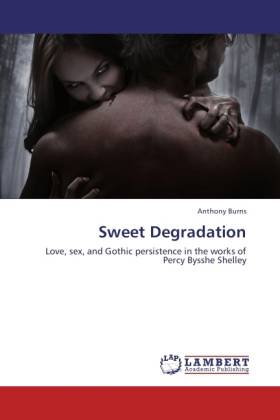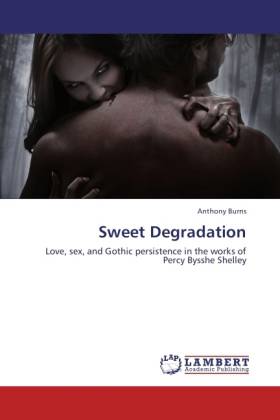
- Afhalen na 1 uur in een winkel met voorraad
- Gratis thuislevering in België vanaf € 30
- Ruim aanbod met 7 miljoen producten
- Afhalen na 1 uur in een winkel met voorraad
- Gratis thuislevering in België vanaf € 30
- Ruim aanbod met 7 miljoen producten
Zoeken
Sweet Degradation
Love, sex, and Gothic persistence in the works of Percy Bysshe Shelley
Anthony Burns
Paperback | Engels
€ 107,45
+ 214 punten
Omschrijving
This thesis examines the persistent influence of Gothic fiction upon the works of Percy Bysshe Shelley throughout his career, beginning with its obvious manifestations in his early novels and the Victor and Cazire poems, and proceeding to trace its continued presence throughout the major works. Particular emphasis is placed on the use of this trope within depictions of love and sexuality a conjunction which may be traced from the poet's juvenile period right through to The Triumph of Life and it is argued that in spite of repeated efforts to imagine a redemptive system of sexual ethics (most comprehensively attempted in the Platonic commentary A Discourse On the Manners of the Antient Greeks Relative to the Subject of Love ), Shelley is never entirely able to reject his psychological scepticism which the Gothic with its depictions of morbid and sadistic sexuality embodies.
Specificaties
Betrokkenen
- Auteur(s):
- Uitgeverij:
Inhoud
- Aantal bladzijden:
- 268
- Taal:
- Engels
Eigenschappen
- Productcode (EAN):
- 9783846520499
- Verschijningsdatum:
- 13/10/2011
- Uitvoering:
- Paperback
- Afmetingen:
- 152 mm x 229 mm
- Gewicht:
- 395 g

Alleen bij Standaard Boekhandel
+ 214 punten op je klantenkaart van Standaard Boekhandel
Beoordelingen
We publiceren alleen reviews die voldoen aan de voorwaarden voor reviews. Bekijk onze voorwaarden voor reviews.







